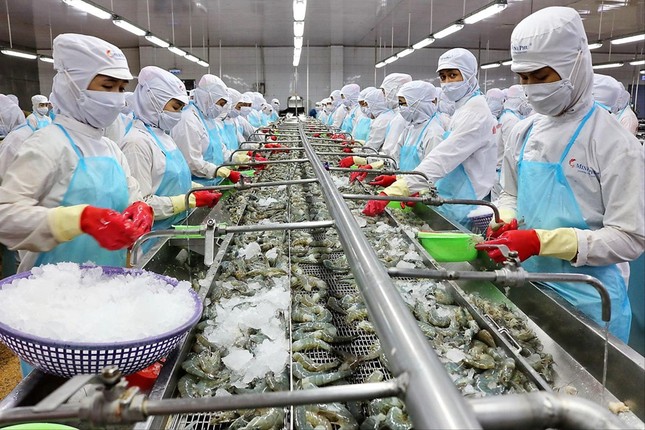
Vietnamese shrimp exports to the US avoid high anti-dumping duties when Vietnam is recognized as a market economy.
We will continue to request
After the US Department of Commerce issued its conclusion, the Ministry of Industry and Trade immediately expressed regret that the US has not yet recognized Vietnam as a market economy.
According to the Ministry of Industry and Trade, if the US Department of Commerce had reviewed the dossier and the reality in Vietnam objectively and fairly, it could have acknowledged that Vietnam is already a market economy, as 72 other economies have done.
The Ministry of Industry and Trade also said that in the future, it will study and analyze the arguments in the US Department of Commerce’s report on Vietnam’s economy to supplement and improve its arguments. It will then resubmit the dossier requesting the US to reconsider Vietnam’s market economy status to concretize the Vietnam – US Comprehensive Strategic Partnership, thereby promoting bilateral economic, trade, and investment cooperation for the benefit of businesses and people of both countries.
Talking to Tien Phong Newspaper, a representative of the Ministry of Industry and Trade said that the failure to recognize Vietnam as a market economy means that Vietnamese exporters will continue to be discriminated against in anti-dumping and countervailing duty investigations conducted by the US. The actual production costs of Vietnamese enterprises will not be recognized, and they will have to use the “surrogate value” of a third country to calculate the dumping margin.
Minh Phu Seafood Corporation, Vietnam’s leading shrimp exporter, once considered the US its largest market and focused on capturing market share. However, it has also been the most turbulent market for the company due to consecutive anti-dumping and anti-circumvention duty cases.
In 2020, the US Customs and Border Protection (CBP) announced that it would investigate the circumvention of anti-dumping duties on Minh Phu’s shrimp exports to the US, with a temporary deposit rate of 10%. The reason was that the company was accused of using Indian shrimp raw materials (which are subject to anti-dumping duties) to export to the US.
Mr. Le Van Quang, CEO of Minh Phu Seafood Corporation, said that the accusation had put the company in a very difficult position. To prove its innocence, the company had to hire expensive lawyers in the US and handle a massive amount of reports that would normally take three years to complete, but the US only gave them three to six months. This forced the company to mobilize all its personnel, sometimes even halting production, to focus on the reports, resulting in the company’s 2020 production and business results not meeting the plan.
At the beginning of 2021, the company was exonerated, and the anti-dumping duty rate returned to 0%. However, according to Mr. Quang, in recent years, Minh Phu has had to shift its market focus and significantly reduce its market share in the US.
Mr. Ngo Sy Hoai, Vice Chairman and General Secretary of the Vietnam Timber and Forest Products Association, said that the US is the largest consumer market for Vietnamese wood and wood products. However, Vietnamese wood exports to the US have always faced many barriers and risks due to anti-dumping and countervailing duty investigations.
According to Mr. Hoai, the US is investigating hardwood plywood products exported from Vietnam to the US, and 37 Vietnamese enterprises are at risk of being imposed very high taxes. In addition, the US has initiated an investigation into kitchen cabinet and vanity products exported from Vietnam. This makes it difficult for enterprises to export to the US.
Costa Rica Recognizes Vietnam as a Market Economy
On August 5, with the approval of Costa Rican President Rodrigo Chaves, the country’s Foreign Trade Minister Manuel Tovar directly informed and handed over a diplomatic note on Costa Rica’s recognition of Vietnam as a market economy. Thus, Costa Rica became the 73rd country to recognize Vietnam’s market economy status.
Prepare to Overcome Barriers
Talking to Tien Phong Newspaper, economist Pham Chi Lan said that if Vietnam is recognized as a market economy by the US, Vietnamese enterprises will face less pressure in terms of being accused of receiving subsidies and dumping. Ms. Lan observed that for a long time, enterprises have been under heavy pressure from non-tariff measures, and sometimes the US applies strong measures to Vietnamese enterprises for competitive interests. “Vietnam has transitioned to a market economy for many years, but the US and the European Union have not recognized it, which is a significant barrier. If the US recognizes it, it will be easier to get recognition from the European Union,” she said.
According to Ms. Lan, this “push” will help promote external markets. Domestically, agencies need to continue to innovate more vigorously according to the market economy institution to make the recognition more solid. However, to seize this opportunity, Vietnamese enterprises need to transform themselves to meet criteria such as digital transformation, green growth, and catching up with global trends.
Dr. Le Dang Doanh, former Director of the Central Institute for Economic Management (CIEM), said that opportunities go hand in hand with challenges. Vietnamese enterprises must respect their commitments to implementing a market economy and make substantial progress in transparency. To do this, enterprises need to transform robustly into a digital economy and innovate in trade with US partners.
Mr. Doanh also recommended that Vietnamese authorities be serious, guide and support enterprises, and strictly handle violations in the origin of goods to avoid a few bad apples spoiling the barrel. Associations and authorities need to closely monitor and strictly handle enterprises with signs of fraud.
(To be continued)















